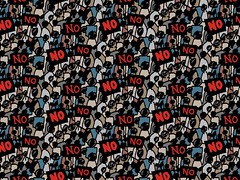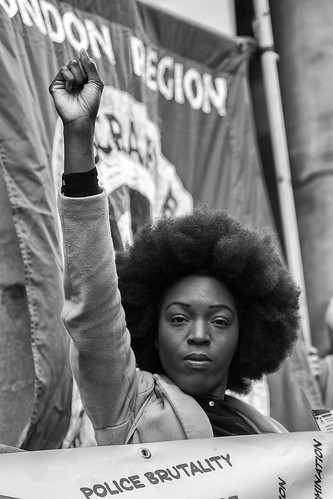Putting Your Life On The Line For Your Opinion Or Actions
Posted by Mitch Mitchell on Jun 14, 2017
I have 3 intriguing stories to share with you, all of which occurred within the last month or so. In two of them the participants received death threats; in the other, the participant actually received the death penalty. Let's take a look at these events.
|
In the first story, a Philosophy professor at Texas A & M University named Tommy Curry started receiving hate mail and death threats based on comments he made in an interview years ago that recently came to light. His comments were based on his belief that there were times in history where there's been violence led by black people who were part of fighting a revolution for rights in America. His actual words were:
"When we have this conversation about violence or killing white people it has to be looked at in the context of a historical turn, and the fact that we’ve had no one address, like, how relevant and how solidified this kind of tradition is for black people saying, “look in order to be equal, in order to be liberated, some white people may have to die,†I’ve just been immensely disappointed, because what we look at week after week is national catastrophe after catastrophe where black people, black children, are still dying..."
A conservative writer named Rod Dreher, who wrote an article called When Is It Ok To Kill Whites?, referred to this particular interview and "quoted the professor as saying this:
“In order to be equal, in order to be liberated, some white people might have to die...â€
I can see why some people would be up in arms over that quote... if it was what he actually said.
In the second story, a Princeton Professor of African American Studies named Keeanga-Yamahtta Taylor had to cancel lectures in Seattle and at the University of California, San Diego when she started receiving death threats and racist emails because of comments she made during commencement ceremonies at Hampshire College in Massachusetts that were unkind to the currently elected leader in Washington. Then again, she did refer to him as "the most powerful politician in the world, is 'a racist and sexist megalomaniac'"; alrighty then!
"Faux Spews" (that's what I call them) picked up on the story, titled it "That man" a ‘racist, sexist megalomaniac,’ Princeton prof says in commencement speech, and that was pretty much that. The professor said she was canceling the appearances out of “fear of my safety and my family’s safety,†after receiving emails containing “specific threats of violence, including murder...â€, not to mention all the racist and sexist name-calling against her.
In the final story, a man named Taimoor Raza was convicted after allegedly posting remarks about the Prophet Muhammad, his wives and companions on Facebook and was sentenced to death by a court in Pakistan. The public prosecutor said it was the first time the death penalty had been awarded in a case related to social media. The conviction was supported by Pakistan's Prime Minister Nawaz Sharif, who saw blasphemy as being an "unpardonable offense".
 |
I've always said that there's a fine line between free speech and suffering consequences for one's actions. In an article titled Are You Entitled To Your Behavior I wrote "If you think you have ultimate free speech, say something to the wrong person and see how well they respect your right to say anything you want." As I look back on that statement, I'm not sure I covered properly what I wanted it to mean.
There are things I don't like to hear, in which case I avoid people who say them. There are things I say that people don't want to hear and they avoid me. All of us are allowed to have free speech in this country... as long as we're willing to deal with what comes from it.
With that said, we also need to realize that when we're in the public eye that we might want to temper our words, no matter the positions we take. I'm not afraid to stoke the borders of controversy, as I proved with a wrote an article last year titled White America, It’s Not Always About You. I took a position that white people seemed to always be complaining about black people protesting for equality and fairness (and not being killed consistently by police officers who get off all the time) as if they're being treated unfairly.
I was serious, and the article shows it. What it wasn't was a condemnation against anyone in particular; for that matter the wording was pretty calm by comparison. I addressed a current topic during Black History Month, wrote my opinion, stated some facts, and moved on with life. I didn't advocate an overthrow of anyone, call for anyone's head, or call "almost anyone" names (I did say one person was irrelevant, but that's not quite name calling is it?). Even in an angered state, I was under pretty good control and chose my words carefully.
Intolerance to the words of others isn't a black or white issue; it's not a conservative vs liberal issue. It's an individual issue, one that everyone needs to start taking seriously in these days of vitriolic responses, where death threats and name calling is a common occurrence.
It doesn't have to go that far to be a bad thing. Sometimes all it takes is wearing something someone else doesn't like or using bad language at work or in public settings. It can even be an inappropriate quip meant to be a joke but said to the wrong person or audience that can cause serious consternation and bad feelings.
For the most part, those things won't put your "real" life on the line... but what about your "career" life? How willing are you to take those types of chances with the possibility of making yourself unemployable or cost you a lot of income? Or, in the wrong person's mind, something that actually puts your life and your family's lives at risk?
Just something to think about the next time you believe you're ready to put out your opinion and choose the wrong words in doing it.



Whatever we do we should be prepared to accept whatever consequences come our way. If in doubt about saying or doing something we should probably consider what will come of it.
I do think we’ve gotten into rather ugly uncomfortable times. I wish everyone could chill a bit and let reason be their guide. I’m concerned for the future, but then I’m not overly optimistic from a worldly perspective.
The only reason these are dangerous times is because everyone has access to information like never before, and not all of it is verified or even meant to be true before it’s put out there. Not only that but everyone who has an opinion is ready to express it without thinking ahead of the potential ramifications of agitating the wrong person or people into acting in extreme ways.
It’s the reason I gave up news years ago and the reason I gave up politics back last September. It didn’t matter what the truth was; people were just yelling at each other and I knew that it was going to erupt into what it became. No one was going to listen or move off their position, no matter what.
The best thing I hope for with my blogs is to have a conversation when one is needed and present a perspective overall without necessarily always taking sides… although I’ll take sides when I need to. lol I got into blogging knowing that everyone wasn’t going to agree with my position on things, and as long as I was willing to accept that then it was all good… as long as people stay on point if they want to disagree with something I’ve written and don’t use bad language.
As big as I wish I was in recognition, the last thing I want to have to deal with are death threats because I’ve inflamed someone by not deftly using proper language… which some call politically correct and I call being smart 🙂